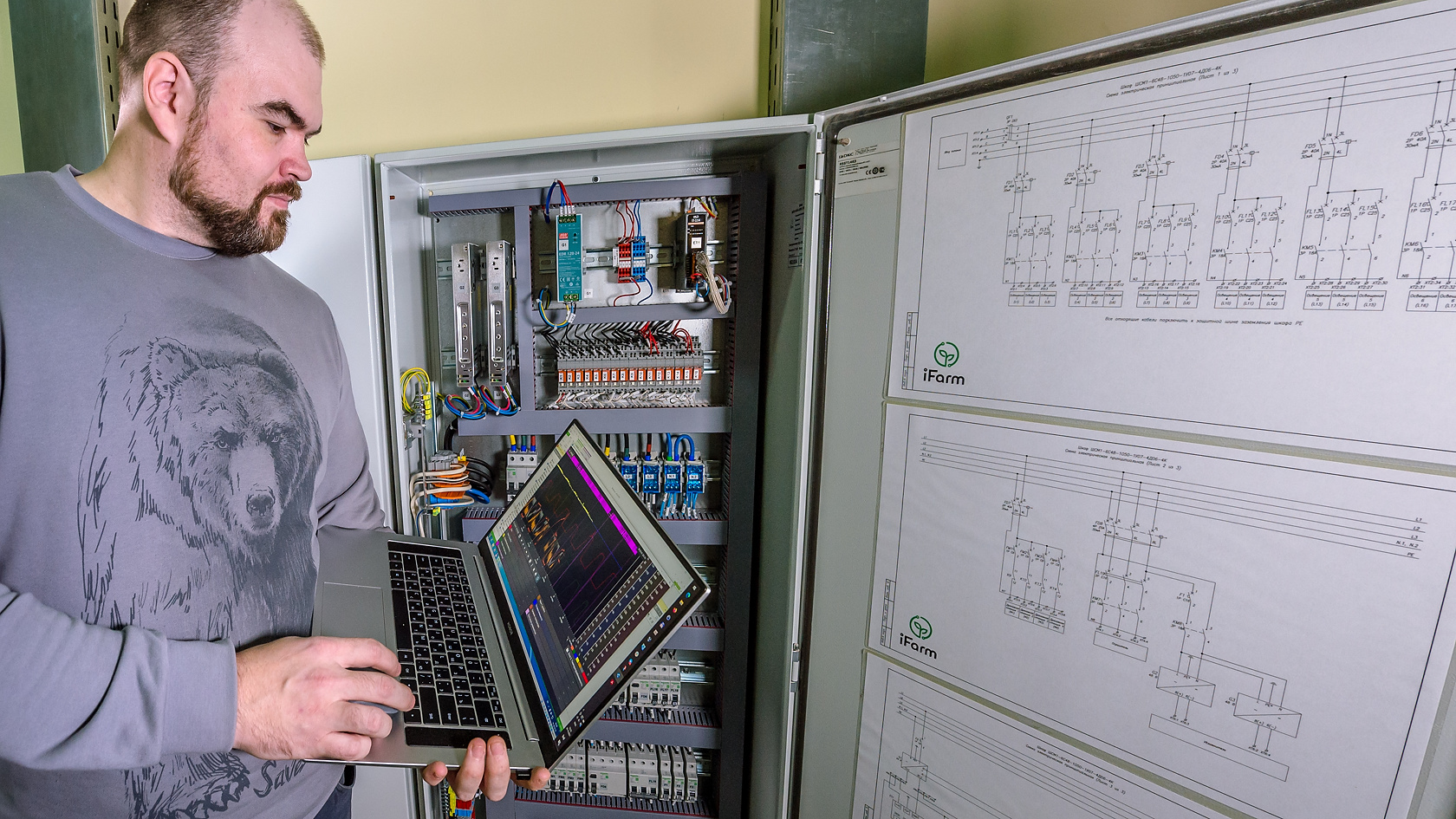By clicking SUBMIT, you agree to the processing of personal data and to the privacy policy
What kind of equipment is necessary for a vertical farm
What kind of equipment is necessary for a vertical farm
Hydroponic vertical farms allow you to harvest fresh and healthy products all year round. Salads, herbs, vegetables and berries grow in a controlled environment where all processes are automated. What equipment should be used for vertical farming?
A hydroponic vertical farm is a modern technological production that allows you to harvest fresh and healthy products without pesticides all year round. Edible plants — salads, herbs, vegetables and berries — grow in a controlled environment where all processes are automated. How to use vertical agricultural equipment correctly? We will tell you in our blog.
A hydroponic vertical farm is a modern technological production that allows you to harvest fresh and healthy products without pesticides all year round. Edible plants — salads, herbs, vegetables and berries — grow in a controlled environment where all processes are automated. How to use vertical agricultural equipment correctly? We will tell you in our blog.
The advantage of vertical farms is a fully controlled environment
The technology of vertical farms allows you to grow plants in urban locations. This reduces the delivery time of products to consumers, reduces logistics costs, and minimizes the carbon footprint. The production itself is completely isolated from the external environment, which means that dirty air, dust, toxic precipitation, harmful impurities and pathogenic substances do not affect the plants in any way.
No need for sunlight is a significant advantage of vertical farms. Salads, leafy greens, vegetables, and strawberries grow perfectly with artificial lighting. Cutting-edge LED lamps provide plants with a full light spectrum for healthy growth.
No need for sunlight is a significant advantage of vertical farms. Salads, leafy greens, vegetables, and strawberries grow perfectly with artificial lighting. Cutting-edge LED lamps provide plants with a full light spectrum for healthy growth.
The process of growing on a vertical farm does not depend on the season and the amount of sunlight. Therefore, vertical farms compare favorably with traditional translucent greenhouses. For example, in summer, salads grow badly in translucent greenhouses because of the extra heat. As for winter, nothing grows there at all in many regions, since such greenhouses cannot be operated in the cold season.
A fully controlled environment created with the help of technology is a way to grow delicious and healthy food near the consumer in an environmentally friendly way. Whether tomatoes with thick skins are less tasty, they are stored longer to drive 1,500 kilometers from the field to the grocery store. Instead of changing the genetics of plants, we can change the approach to agriculture, making it more sustainable for the planet and people. To organize such production, professional vertical farming equipment is required.
A fully controlled environment created with the help of technology is a way to grow delicious and healthy food near the consumer in an environmentally friendly way. Whether tomatoes with thick skins are less tasty, they are stored longer to drive 1,500 kilometers from the field to the grocery store. Instead of changing the genetics of plants, we can change the approach to agriculture, making it more sustainable for the planet and people. To organize such production, professional vertical farming equipment is required.
What is required for the construction of a vertical farm?
The high-tech equipment of the vertical farm is located in a room with electricity, water and sewage system. The estimated power of electricity required for 1 m2 of crop area ranges from 0.1 to 0.4 kW, depending on the size of the farm and its assortment. The size of the room can vary from several tens to thousands of square meters, which means that both a small basement and an abandoned trolleybus depot will be suitable. The recommended ceiling height is 5−6.5 meters. Learn more about how to open a vertical farm.
What equipment is used on the vertical farm?
iFarm technology assumes minimal human participation in the production cycle, the main work is done automatically. The sheme below shows the key components that make up the automated hydroponic vertical farm
The main component of the vertical farm is a multi-tiered shelving system. Pots with plants are placed on its tiers. It includes:
- precast metal shelving (metal structures);
- pallets;
- phyto-light system (with electrical wires, junction boxes and power supplies);
- nutrient solution circulation system (with plastic pipes, fittings, pumps, tanks, etc.);
- fasteners and other auxiliary elements.
Shelving modules (with the height from 2 to 7 meters) can be single or double, passages for maintenance personnel are provided between them. LED phytolamps, electrical wiring, junction boxes and power supplies, pipes for nutrient solution circulation are mounted on the racks, and pallets are installed. A pressure tank is installed on the upper tier, from where the nutrient solution comes: through a system of special tubes, it spreads from top to bottom along the pallets of the entire module.
The climate control system ensures that the temperature and humidity of the air, as well as the CO2 level, are suitable for plant growth on the farm. It is based on a fan coil chiller — an industrial installation that maintains the air temperature in the growing rooms within a given operating range. Additionally, the climate control system automatically humidifies/dehumidifies the air.
In order to ensure normal growth and development of plants, the required level of carbon dioxide must be constantly maintained in the growing rooms. This task is solved by the installation of CO2. It consists of a standard 40-liter cylinder, to which special tubes are connected through a reducer that automatically supply CO2 to the growing rooms.
In order to ensure normal growth and development of plants, the required level of carbon dioxide must be constantly maintained in the growing rooms. This task is solved by the installation of CO2. It consists of a standard 40-liter cylinder, to which special tubes are connected through a reducer that automatically supply CO2 to the growing rooms.
During growth and transpiration, plants evaporate water — many times more than their own weight. A patented dehumidification system developed in iFarm allows you to collect it. The water that forms on the fan coils of air conditioners is cleaned by a System of disinfection and reuse of condensate water. It can be reused by directing it to humidify the air (humidity inside the growing compartment is ~ 70%) or for a nutrient solution. This opportunity is especially in demand in regions with a natural shortage of fresh water. How vertical farms save water, read more in our blog.
Do you want to start your own vertical farm?
The nutrient solution preparation system mixes the mother liquor with water in the required proportion and delivers the finished nutrition to the Circulation system. The composition of the solution varies depending on the crops grown. It contains macronutrients (nitrogen, phosphorus, potassium, calcium, magnesium, sulfur, iron) and microelements (boron, manganese, zinc, copper, molybdenum, etc.) necessary for the full growth of the plant.

The core of the Nutrient solution preparation System is the fertigation unit. This is a patented device, also developed at iFarm, which, according to a given program (a "recipe" for growing or a technological map available in the Growtune IT platform), mixes water with masterbatch solutions. The result is a balanced "cocktail" containing everything that a plant needs at a particular stage of growth (for example, one food is used for seedlings, another for adult plants).

One of the main advantages of the iFarm fertigation unit is the ability to mix any amount of nutrient solutions for different crops (salads, herbs, tomatoes, cucumbers, strawberries and edible flowers). To do this, six masterbatch solutions (concentrates of nutrient components that are diluted to obtain solutions with a certain content of useful substances) are added to the mix at the same time.
In addition to the fertigation unit, the nutrient solution preparation system includes:
In addition to the fertigation unit, the nutrient solution preparation system includes:
- a water treatment system based on reverse osmosis technology;
- storage tank with prepared water;
- storage tank with ready-made nutrient solution;
- containers with masterbatch solutions;
- pumping station.

The farm management automation system monitors the microclimate parameters in the growing department and automatically controls the equipment of the systems listed above. It solves the following tasks:
- fully automatically supports the parameters of the microclimate (temperature, humidity, CO2 concentration), controls lighting and irrigation in accordance with the technological map of the crops;
- promptly notifies staff about deviations of critical parameters;
- stores and displays historical trends (parameters of the environment in which the crop ripened) for further analysis of system parameters;
- remotely monitors the operation of equipment and parameters;
- implements separate access rights of personnel at the level of objects and functions;
- logs the operator’s actions on system management, etc.

A common mistake during the start of production on a vertical farm is underestimating the importance of the accounting system. We recommend that already at the construction stage of the farm pay attention to the issue of introducing a system of accounting for products and raw materials, so that it starts working from the first day of the production cycle. Do not neglect this necessity to avoid confusion at the stage of commercial production.
To solve this problem, iFarm provides the Growtune software suite, which allows you to plan plantings, monitor the process of crop growth and compliance with regulations on the farm, manage inventory and keep accounting. The application is installed on a smartphone or tablet and should always be at hand with employees of the vertical farm.
To solve this problem, iFarm provides the Growtune software suite, which allows you to plan plantings, monitor the process of crop growth and compliance with regulations on the farm, manage inventory and keep accounting. The application is installed on a smartphone or tablet and should always be at hand with employees of the vertical farm.

How much does the equipment for vertical farming cost?
Industrial vertical farms are not an "amateur" solution when equipment can be purchased separately from each other. Large-scale production always involves an integrated approach to the organization of the growing process and the use of professional equipment. The amount of investment depends on the area of the farm (the larger it is, the more racks, lamps, power supplies, wires, pallets, etc. are needed). For example, a ready-to-use iFarm technology farm with a floor area of ~1,000 m2 will cost around $ 2,000 per m2. On average, the cost of vertical equipment for large-scale production on the world market is $ 1−3B. Use an iFarm online calculator to estimate potential profits and find out the payback period of your vertical farm project.
At iFarm we offer bespoke vertical farming systems, along with installation and commissioning of equipment, and full-service support. Fill out the form to learn more.
By clicking SUBMIT, you agree to the processing of personal data and to the privacy policy
By clicking SUBMIT, you agree to the processing of personal data and to the privacy policy
Recommended

